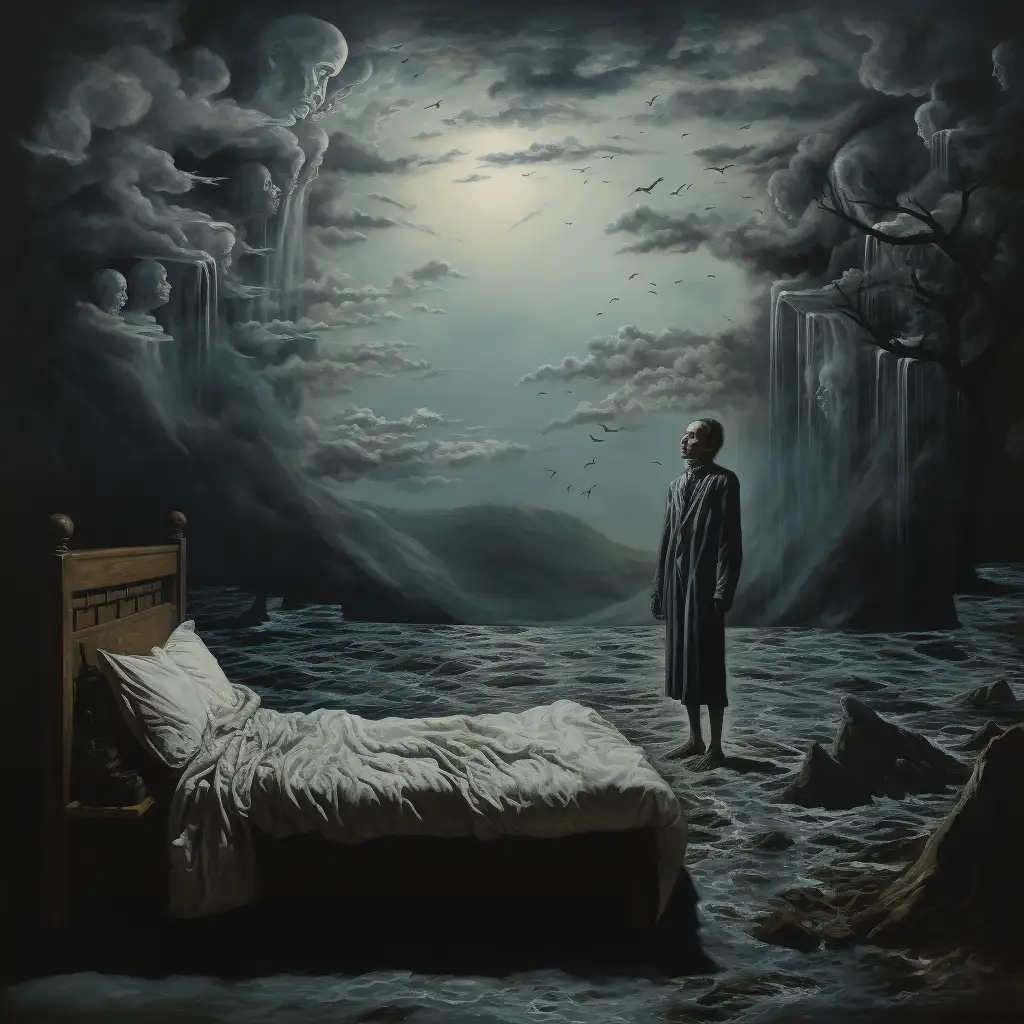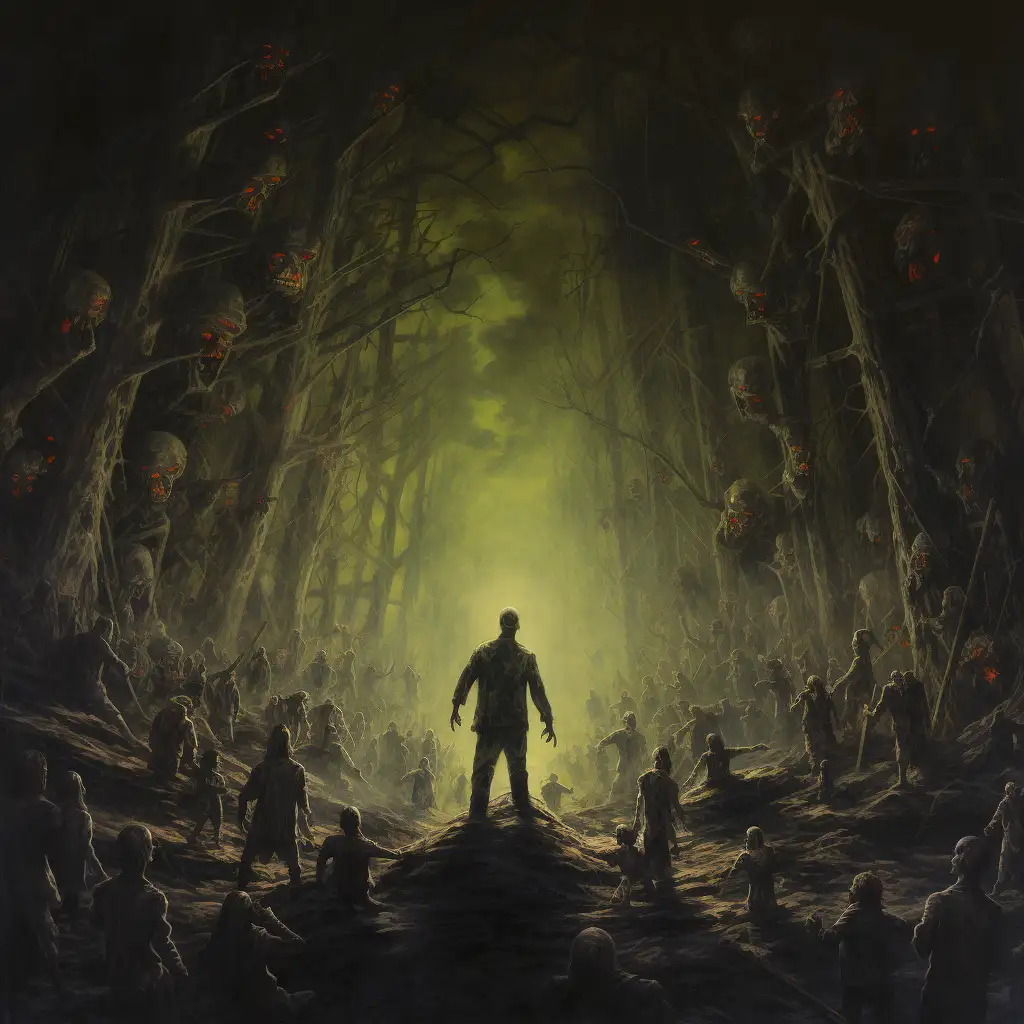Key Takeaways
2. Dream interpretation is a complex and varied endeavor, influenced by psychoanalytic, cognitive, cultural, and personal perspectives.
3. From a psychoanalytic perspective, dreams about death may represent repressed desires, thoughts, and motivations too powerful or taboo to process during waking hours.
4. Cultural beliefs play a significant role in dream interpretation, with death dreams having different meanings across various societies.
5. Dreams about death often symbolize transformation and change rather than literal death, reflecting endings and new beginnings in our waking lives.
6. Dreaming of one’s own death can signal a significant transitional phase or a desire to leave something behind in life.
7. Dreams about the death of loved ones may represent fears, anxieties, or changes in the dynamics of the relationship.
8. Emotions play a crucial role in dream experiences, and dreams about death can evoke a wide spectrum of feelings, including fear, anxiety, calm, or relief.
9. Engaging in mindful activities and discussing dreams with someone you trust can help cope with distressing dreams and gain insights into their meanings.
Dreams, those ethereal narratives that play out while we slumber, can sometimes leave us puzzled, excited, or even a bit unsettled. One common theme that we might encounter is the concept of death. If you’ve ever woken up from a dream about dying, you might feel a bit rattled or concerned. But don’t worry, this is a completely normal part of the dream experience.
A Primer on Dream Interpretation
Interpreting dreams can be a fascinating journey, and it’s important to remember that this is not a one-size-fits-all endeavor. In fact, the theories about what dreams mean and why we dream in the first place are as varied and unique as the dreams themselves.
Psychoanalytic Theory
First, let’s talk about the psychoanalytic view. This perspective comes from the work of Sigmund Freud, who believed that dreams are a reflection of our repressed desires. According to Freud, dreams are a kind of ‘wish fulfillment’. In his book, “The Interpretation of Dreams”, Freud argues that our dreams are a reflection of our unconscious desires, thoughts, and motivations that are too powerful, too taboo, or simply too complex to be processed during our waking hours.
The Cognitive Perspective
On the other hand, cognitive theories take a different approach. This perspective suggests that dreams are simply a way for our brain to process the day’s events. For instance, the “activation-synthesis hypothesis”, put forth by Harvard University psychiatrists J. Allan Hobson and Robert McCarley, proposes that dreams are the result of our brains trying to piece together a story out of random signals from the brain during REM sleep.
Cultural and Personal Context
Finally, we must consider the impact of cultural and personal contexts on dream interpretation. Different cultures around the world have unique beliefs and interpretations of dreams, often deeply interwoven with their religious and social constructs. For instance, some Native American tribes view dreams as a gateway to the spiritual world.
Personal experiences and circumstances also greatly influence dream interpretation. For example, a person who has recently lost a loved one might be more likely to have dreams related to death or dying. Their personal experiences and feelings of grief can shape the narrative of their dreams.
Adding Layers of Complexity
While these theories offer us different ways to interpret dreams, it’s essential to remember that dream interpretation is not an exact science. Each dream is unique to the dreamer. It’s not just about the content of the dream, but also about the emotions that come with it, and the personal and cultural context in which the dream occurs. This makes dream interpretation a complex, but fascinating, endeavor.

Understanding Death in Dreams
When it comes to understanding the symbolism of death in dreams, there are several perspectives to consider. This often unsettling subject can carry profound meaning and reflect various aspects of our inner world and emotional landscape.
The Symbolism of Transformation and Change
Firstly, it’s important to know that death in dreams often symbolizes transformation or change. In the language of dreams, death is not always literal; instead, it can represent an ending of one thing and the beginning of something new. This could relate to various aspects of your life, such as relationships, career, or personal growth.
The Psychoanalytical Perspective
From a psychoanalytical perspective, dreaming about death could signal an internal struggle, a need for change, or a desire to end something in your life. It could be a relationship that’s no longer serving you, a job that you’re not satisfied with, or perhaps a behavioral pattern you wish to break. This interpretation aligns with Freud’s concept of wish fulfillment – the dream serving as a stage where your deep-seated desires and fears can play out.
Cultural Interpretations
Cultural interpretations of death dreams can vary greatly. For example, in some Eastern cultures, dreams about death are often seen as a sign of good luck or a symbol of rebirth and renewal. In contrast, Western cultures may associate such dreams with negative outcomes or view them as a premonition. It’s crucial to bear in mind your cultural background when interpreting your dreams, as it often influences our subconscious mind.
Reflection of Anxieties or Fears
Above all, it’s essential to recognize that dreams about death can be a reflection of our anxieties or fears. It’s a common human experience to have some level of fear or anxiety about death and the unknown. These feelings can manifest in our dreams, providing us a safe space to confront and process these fears.
Common Scenarios of Dreams About Death
Death dreams, like any other type of dream, can take on many forms and narratives. Each scenario holds its own unique symbolism and interpretation, influenced by the specific elements present in the dream. Here are some common scenarios you may encounter.
Dreaming of Your Own Death
One of the most disconcerting experiences can be dreaming of your own death. However, this is surprisingly common and rarely signifies a literal end. Instead, it is often a symbol of transformation or a desire for change. It may indicate that you’re going through a significant transitional phase in your life or perhaps there’s an aspect of your self or your life that you wish to leave behind.
Dreaming of a Loved One’s Death
Dreaming of a loved one’s death can also be quite distressing. It’s important to remember that such dreams rarely serve as premonitions. Rather, they often reflect our deep-seated fears and anxieties about losing the people we care about the most. Additionally, it could signify a change in the dynamics of your relationship with that person.
Witnessing Death
If you find yourself witnessing death in your dream, this could indicate feelings of helplessness or guilt. It may also signify that you’re undergoing some changes in your life, and these dreams are a way for your subconscious mind to process and make sense of these changes.
Implication of Death
Sometimes, death may not be directly seen but is instead implied or suggested in some way in your dreams. This could be a symbolic representation of endings and beginnings, signaling a period of transition. This type of dream may invite introspection and a reconsideration of the changes and transitions you’re going through in your life.
Dreams of Dying: A Deep Dive
Encountering your own death in a dream can be unsettling. Yet, these dreams can offer profound insights and rich symbolism tied to your waking life. Let’s take a deeper dive into what these dreams might represent.
Facing Fear and Uncertainty
Firstly, dreams of dying often bring up intense emotions, such as fear or sadness. It’s quite natural to feel fearful when dreaming of your own demise – after all, death is one of the greatest unknowns we face as humans. These dreams can allow us to confront and explore these feelings in a safe environment.
Relief and Liberation
On the other hand, feeling relief or a sense of liberation in a dream about your own death might seem unusual, but it’s not uncommon. Such feelings can indicate a desire to release or move away from something that has been causing you stress or unhappiness in your waking life. It can symbolize the need for ending a chapter and the anticipation of starting a new one.
The Metaphorical End
In most cases, dreams about your own death are less about a literal end and more about a metaphorical one. Death in dreams is often a symbol of transformation, a change of state, or the end of a particular phase or aspect of your life. It could be related to any number of things in your waking life – maybe you’re moving on from a relationship, changing careers, or evolving in your personal growth.
Transitional Phases and Desire for Change
Finally, these dreams could indicate that you’re going through a significant transitional phase in your life or yearning for a substantial change. Change can be scary, and these dreams may reflect your anxieties and uncertainties about the future. At the same time, they can also signal your readiness for change and your desire to move forward.
Dreams of Others Dying
Dreaming about the death of others can stir strong emotions and leave lasting impressions. The interpretation of these dreams can be complex, depending on several factors like the identity of the person, the nature of their death, and your emotional response.
Identity of the Deceased
The identity of the person dying in your dream is crucial. Is it a loved one, a friend, a colleague, or a stranger? Each holds different symbolic meanings. For instance, dreaming about a loved one’s death often symbolizes fear of loss or change in your relationship with them. On the other hand, if it’s a stranger, the dream could be more about the unknown and your subconscious dealing with change or fear of the unexpected.
Nature of Death
How the person dies in the dream also offers valuable clues. For example, if the death is peaceful, it could indicate a smooth transition or change. On the contrary, a violent or sudden death could reflect abrupt changes or turmoil in your waking life.
Emotional Response to Their Death
Your emotional response in the dream can also shed light on its meaning. Feelings of sadness might symbolize a sense of loss or fear of losing something important in your life. Alternatively, relief or indifference might indicate a desire to let go of certain burdens or aspects of your life that no longer serve you.
Symbolism of Change or Separation
Generally, dreaming about others dying could symbolize fear of change or separation. If you dream of a loved one dying, it might indicate fear of losing them or anxiety about a possible change in your relationship. If the person is unknown to you, it could represent an aspect of yourself that you are changing or letting go of.

The Role of Emotions in Dreams About Death
Emotions are the heart of dream experiences. They add color and dimension to the narratives woven by our subconscious minds. In dreams about death, the emotional landscape can guide us to more profound interpretations and insights.
Emotional Spectrum
Dreams about death can evoke a wide spectrum of emotions, from fear and anxiety to calm and peace. You may wake from such a dream feeling distressed, or oddly, you may feel relieved. It’s essential to not shy away from these emotions but instead acknowledge and examine them.
Anxiety and Fear
Dreams about death are often accompanied by feelings of anxiety or fear. This could be reflecting anxieties or fears in your waking life, possibly linked to changes or transitions you’re going through. This could also symbolize a fear of the unknown or the end of something significant in your life.
Peace and Acceptance
On the other hand, if you feel peaceful or accepting about a death in your dream, it might signify that you’re coming to terms with certain changes or endings in your life. It could indicate a readiness for transformation or a new phase of your life. A sense of peace could also signify acceptance of the impermanence of life and the inevitable cycle of endings and beginnings.
Link to Waking Life
Examining the emotions you experience in your dream and considering how they relate to your waking life is crucial. Are there elements in your life that trigger the same feelings? Can you find parallels between your dream emotions and your real-life experiences? These are valuable questions to ask as you decode the emotional tapestry of your dreams.
Death Dreams and Life Transitions
Life is a series of transitions and transformations, and our dreams often mirror these shifts. Dreams about death, startling as they may be, are often linked to significant life transitions, symbolically representing the end of one phase and the dawn of another.
Symbolic Endings and Beginnings
In dream symbolism, death often signifies endings and beginnings. It’s about closing one chapter of your life to make way for the next. This could be any major shift in your life – graduating from school, moving homes, starting a new job, or ending a relationship. These dreams reflect your subconscious mind grappling with the change, adjusting to the new normal, and saying goodbye to the old.
Processing Changes
Dreams about death can be a way for your mind to process these changes. Change, even positive, can be stressful. Dreaming about death can provide a safe space for your mind to explore and adapt to these changes. It can be a way of mentally and emotionally preparing for what lies ahead, helping you transition smoothly into your new phase of life.
Navigating Uncertainty
Significant life transitions often come with their share of uncertainties and anxieties. Death dreams can reflect this uncertainty, symbolizing your fears and apprehensions about the future. However, they can also indicate your readiness to embrace change and start anew, depending on the emotions associated with the dream.
Personal Growth
Above all, these dreams might point towards your personal growth. As you transition through different stages in life, you evolve as a person. Dreaming about death could symbolize this personal evolution, signifying the end of your old self and the birth of the new.
Coping with Distressing Death Dreams
Dreams of death, while rich in symbolic meaning, can be unsettling or distressing. If you find yourself troubled by these nocturnal narratives, remember that you’re not alone, and there are strategies to help navigate these dreamscapes more comfortably.
Dream Journaling
One effective way to process your dreams is through dream journaling. Keep a notebook and pen by your bed and jot down your dreams as soon as you wake up. Detail as much as you can, not forgetting to note down your emotions. Over time, you might begin to notice patterns, recurring themes, or symbols that could help you understand the underlying messages better.
Mindful Activities
Engaging in mindful activities can also help in coping with distressing dreams. Practices like meditation, yoga, or simply spending time in nature can help you stay grounded and alleviate anxiety or distress caused by dreams. These activities promote a sense of calm and present-moment awareness, which can be beneficial in processing dream experiences.
Discuss Your Dreams
Sometimes, talking about your dreams can provide significant relief. Sharing your dreams with someone you trust—a friend, family member, or therapist—can provide new perspectives and help you feel less alone in your experiences. Remember, it’s perfectly okay to seek support when dealing with unsettling dreams.
Professional Help
If your dreams continue to distress you and impact your quality of life, consider seeking professional help. Therapists and psychologists, especially those who specialize in dream interpretation or sleep disorders, can provide insights and strategies to cope with disturbing dreams.
Conclusion
Death dreams, while often distressing, can offer profound insights into our lives and inner selves. Remember, the world of dreams is complex and subjective. Don’t be frightened by these nighttime narratives. Instead, view them as a bridge to deeper self-understanding. As we’ve explored throughout this article, dreams about dying are rarely about an actual physical end, but more about endings and beginnings in different areas of your life. As with any dream, these ones about death are just another part of the rich tapestry of our unconscious, ripe with symbols waiting to be decoded. With patience and introspection, we can learn to understand and even appreciate these mystifying nighttime narratives.
FAQs
A: While some people believe in the possibility of prophetic dreams, there is no scientific evidence supporting dreams as accurate predictors of literal death. Dreams are generally symbolic and reflect the dreamer’s inner thoughts and emotions.
Q: What do specific scenarios of dying in dreams signify?
A: Different scenarios in dreams can have various meanings. For example, falling from a great height might represent a loss of control in your life, while being chased could indicate unresolved fears or anxieties. It’s essential to analyze each dream in the context of your own experiences and emotions.
Q: Are there any cultural differences in interpreting dreams about dying?
A: Yes, dream interpretation can vary across cultures and belief systems. What may be seen as a negative symbol in one culture could be viewed differently in another. Understanding cultural context can provide additional insights into the meaning of dreams about dying.
Q: Can medication or substances influence dreams about dying?
A: Yes, certain medications, drugs, or substances may impact your dream patterns and content. Some medications can cause vivid dreams or nightmares, while alcohol and recreational drugs may disrupt normal REM sleep, affecting dream recall and content.
Q: Are there common symbols associated with dreams about dying?
A: Yes, common symbols like dark figures, water, mirrors, or significant places from your past can appear in dreams about dying. These symbols often hold personal meaning and should be examined in the context of your own experiences.
Q: Can dreams about dying be therapeutic?
A: Dreams, including those about dying, can have a therapeutic effect. They offer a safe space to explore and process emotions, fears, and unresolved issues. Reflecting on these dreams can lead to personal growth and self-awareness.
Q: Can the emotions experienced during the dream affect its interpretation?
A: Absolutely. Emotions are vital in dream interpretation. Intense emotions experienced during the dream can provide valuable insights into the dream’s significance. Paying attention to how you felt in the dream can help unravel its hidden messages.







